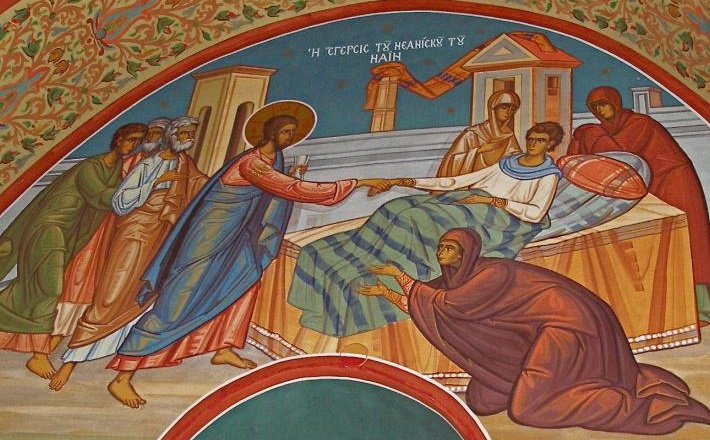Commentary on Luke 7:1-17
One of the marks of the biblical witness, shared by both Testaments, is the efficacy of the divine word. From the beginning—and throughout—the word is powerful, structuring existence, ordering human society, and effecting salvation.
Creation, the Ten Words, the Word made flesh … there is also, fittingly, the “foolishness of our proclamation” (1 Corinthians 1:21). Or as Paul puts it to the Romans, “faith comes from what is heard, and what is heard comes through the word of Christ” (Romans 10:17).
The centurion of Luke 7:1-17 recognizes the power of words in general, identifying himself as one “set under authority.” When he says, “go,” or “come,” or “do this,” things are made to happen—someone comes, someone goes, or does something. He then looks to Jesus, knowing Jesus is set under an authority magnitudes beyond his own. Here, the centurion is tapping into the biblical emphasis on the power of the Word.
This would be one option for the preacher, to shine a light on the power of the spoken word, both theologically and in the life of faith; in other words, not just for the believer, but by (in and through) the believer. The psalms recognize the power of wicked words, and the damage they can do (Psalms 3:2; 27:12; 35), but also the benedictions, particularly having to do with wisdom, that well-meaning words bring (Psalms 37:30; 49:3). The words that we speak have power too; power to harm or to heal, to create, to order our lives, and to share the salvation that Paul wrote of. It may well be that our current cultural climate is crying out for just such a witness and just such a blessing.
Another striking element of this story is Jesus’ reaction to the centurion. When Jesus hears that the centurion says, “Just say the word…” Jesus’ response is recorded as follows:
“When Jesus heard this he was amazed at him, and turning to the crowd that followed him, he said, ‘I tell you, not even in Israel have I found such faith’” (Luke 7:9).
Jesus is “amazed.” That word “amazed” occurs relatively frequently in the New Testament, but is typically used to describe reactions to Jesus, not Jesus’ reactions. In Luke the crowds are amazed because of or at Jesus:
- 2:8 the crowds are amazed by the angels, heard on high
- 2:47 the crowds are amazed at the answers and understanding, given in the Temple, by the boy Jesus
- 4:22 the crowds at Nazareth are amazed at his gracious words, as he interpreted Isaiah 61, saying of the passage, “The Spirit of the Lord is upon me…” and that “Today this scripture has been fulfilled in your hearing.”
- 4:36 the crowds at Capernaum are amazed when he casts out an unclean spirit with a word, saying, “What kind of utterance is this? For with authority and power he commands the unclean spirits, and out they come!”
- 8:25 the disciples are amazed that even the winds and waters obey his word, when he stills the storm
In fact, only twice in the Gospels is Jesus amazed, and only here, in Luke 7:9, is that amazement positive. In Mark 6:6, Jesus is amazed at the unbelief and the outright rejection he experiences in his hometown. Here in Luke, Jesus is amazed precisely because of the faith of the centurion, “I tell you, not even in Israel have I found such faith.”
What this story is trying to do is inspire just such a faith in us; faith in Jesus, faith that trusts that if Jesus says it, it is not simply promised, it is; it is accomplished.
What would it look like for us to have such a faith?
What would it make possible?
Is there anything in our life that shows this forth? What, if anything, about our lives of faith would amaze Jesus?
This last is, perhaps, a little dangerous, at least to try to answer. So maybe asking it, without answering it, can move us closer to the faith of the centurion.
One last word: notice that when it comes to amazement in Luke, it is, again, always related to speaking; first the announcement of the gospel according to the angel-host, and then the power of Jesus’ words—in interpretation and understanding, and in controlling spirits and the elements.
As a whole, this story of the faith of the centurion, inspiring amazement in Jesus, has its roots in the centurion’s amazement at Jesus. The one of whom the angels sang, and of whom the heavenly voice says, “This is my Son, the Beloved,” is set under an authority that can bring nothing other than amazement. The Word which spoke creation into order—“Let there be light!”—the same Word that stills the chaos of human life together—“Do not bear false witness! Do not commit adultery!”—is the same Word that can speak life to the dying, and even the dead.
“But only speak the word….” This statement of amazing faith is the product of a Word that first amazes. Let all who have ears to hear, listen.
PRAYER OF THE DAY
Healing Lord,
By your goodness you healed many who were ill, even raising the dead to life. Restore us to new life, healing our hearts, minds, and spirits, so that we may proclaim praise and gratitude for your compassion to all who will hear. In the name of the one who is himself new life, Jesus Christ our savior. Amen.
HYMNS
Take my life, that I may be ELW 583, 685, H82 707, UMH 399, NCH 448
Healer of our every ill ELW 612
CHORAL
God’s son has made me free, Edvard Grieg


February 7, 2021